Programas de transferencias monetarias sectoriales
Los PTM pueden ayudar a las personas en situaciones de crisis a abordar sus necesidades dentro de un determinado sector humanitario, tales como: agua, alimentos, salud, vivienda, medios de vida, o protección. Los PTM sectoriales pueden ser restringidos o sin restricción, condicionales o incondicionales, y normalmente serán proporcionados como parte de un paquete integral que puede incluir asistencia en especie o servicios.
Cada sector tiene que considerar distintas preguntas, retos, ventajas y riesgos cuando se trata de apoyar la recuperación de las personas dentro de su área de especialización. Esto requiere evidencias, herramientas, orientación y capacidad. Para cumplir los resultados sectoriales a través de los PTM también se requiere de una comprensión multisectorial de las necesidades y de la seguridad económica de los hogares (vea las Transferencias monetarias multipropósito). Mientras que algunos sectores tienen mucha experiencia en la implementación de los PTM y lo han hecho por muchos años, otros se están poniendo al día. La mayoría de los sectores humanitarios están comprometidos y han venido aumentando sus esfuerzos en los PTM sectoriales. El Grupo global de coordinación de clusters (GCCG, por sus siglas en inglés) también se encuentra coordinando el trabajo entre clusters para mejorar la utilización sectorial de los PTM.
Prioridades actuales
La CALP Network trabaja en estrecha colaboración con los grupos técnicos de asistencia en efectivo y equipos de tareas dentro de los clusters globales, que han estado definiendo sus prioridades y planes de trabajo del 2020 durante sus reuniones regulares. Una descripción general y detalles específicos de estas prioridades en cada cluster global está disponible aquí.
Subpáginas de los PTM sectoriales
-
Coordinación y gestión de campamentos y programas de transferencias monetarias
-
Educación y programas de transferencias monetarias
-
Seguridad alimentaria y programas de transferencias monetarias
-
Salud y programas de transferencias monetarias
-
Nutrición y programas de transferencias monetarias
-
Protección y programas de transferencias monetarias
-
Alojamiento y programas de transferencias monetarias
-
Agua, saneamiento e higiene (WASH) y programas de transferencias monetarias
Contenido destacado
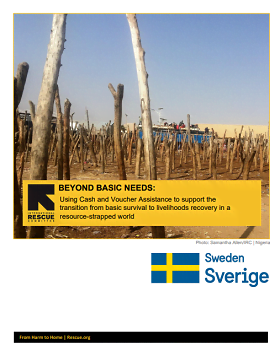
Beyond Basic Needs: Using Cash and Voucher Assistance to Support the Transition from Basic Survival to Livelihoods Recovery in a Resource-Strapped World
Guidelines and Tools
Do you think of yourself as a “cash” person OR as a “livelihoods” person? An “emergency” practitioner OR a “recovery” practitioner? Or do you find yourself unsatisfied with the often narrow implications of these terms? We’ll never have enough funding to provide basic needs support to everyone who needs it for the entire time they are in need, even if we take advantage of the...

Looking into 2020: short overview on global clusters, CVA and the CALP Network
Presentation
Overview as 2020 begins:
• Significant progress and commitment from all global clusters on integration of CVA into their work.
• Significant interest in different regions and by some donors on sector-specific CVA.
• Challenges that remain:
o Dialogue: 1) Ensuring CVA specialists understand sector specificities and successfully bank on the technical expertise emanating...

Building Evidence to inform the Effective Use of CASH and Voucher Assistance in Emergency Sanitation and Hygiene Programming
Report
An analysis of 5 case studies of utilization of CASH/Voucher Assistance are presented and analysed in the attempt of building evidence on their utilization in emergency WASH Sanitation and HP programming. Findings and recommendations are provided on Coordination, Situation and Response Analysis, Program Design, Implementation, Monitoring and Evaluation.
Últimos recursos

Kenya – Cash Grants to Support Post-Election Violence Livelihood Recovery
Case Study
In response to post-election violence starting in late December 2007, ACF implemented a cash-based intervention in Nakuru, South Rift Valley, Kenya. This programme supported the local displaced and host population, who had been excluded from aid provided to internally displaced persons (IDPs) living in...
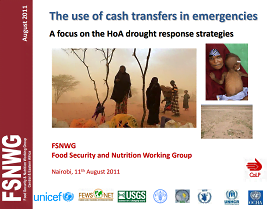
The Use of Cash Transfers in Emergencies: A focus on the HoA response strategies
Presentation
A focus on the HOA drought response strategies
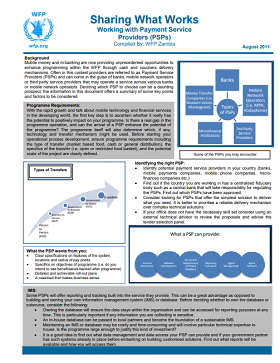
Sharing What Works – Working with payment service providers (PSPs)
Report
A handy tool on choosing payment service providers for delivering cash transfers developed by WFP Zambia. Mobile money and m-banking are now providing unprecedented opportunities to enhance programming within the WFP through cash and vouchers delivery mechanisms. Often in this context providers are...

Evaluation Report Fresh Food Voucher – ACF Santa Cruz, Bolivia
Case Study
This report presents and discusses the results of a pilot study to deliver vouchers, which can be exchanged for fresh foods, to indigenous communities in rural areas of the Bolivian Chaco. This intervention is meant as an emergency measure as a result of the prolonged drought that had endangered the food...

Good Practice Review 11: Cash transfer programming in emergencies
Guidelines and Tools
The GPR is intended for humanitarian practitioners who plan and implement emergency responses – both those who are already familiar with cash-based interventions and those who are not. It synthesises cash transfer guidelines, highlights lessons from evaluations and adds practical examples drawn from...
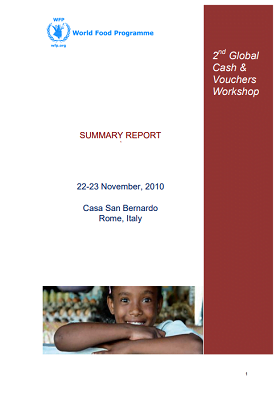
WFP 2nd Global Workshop on Cash and Vouchers
Report
Executive Summary The 2nd Global Cash and Vouchers Workshop in Rome 22-23 November 2010, was convened jointly by the Programme Division (ODX) and the Policy Planning and Strategy Division (OEDP), one year following the 1st Global Cash and Vouchers Workshop convened in Johannesburg 17-19 November 2009. The...

The CALP Network 4th Global Learning Event: Global innovations and lessons learned from response in South and South-East Asia (Final report)
Report
The 4th CALP Network Global Learning Event was held in Bangkok, Thailand on the 16th and 17th February 2011, hosted by the CALP Network in partnership with the International Federation of the Red Cross and Red Crescent Societies (IFRC). This inter-agency event was designed to present the latest thinking...
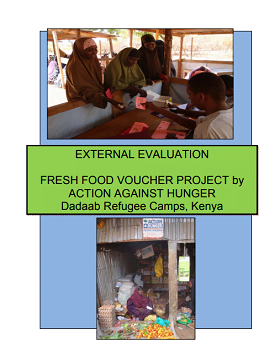
External Evaluation: Fresh Food Voucher Project by Action Against Hunger in Dadaab Refugee Camps, Kenya
Report
The town of Dadaab in North Eastern Kenya is home to three refugee camps: Hagadera, Dagahaley and Ifo hosting over 240,000 people. The camps were established in mid-1992 after the closure of the Liboi camp, which was too close to the Kenya/Somali border to ensure adequate security. Continued insecurity in...
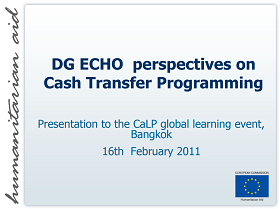
DG ECHO perspectives on Cash Transfer Programming
Presentation
A presentation accompanying the CALP Network global learning event, Bangkok 16th February 2011, covering the following topics: DG ECHO position on the use of Cash &Vouchers (C&V) Trends in funding C&V projects Using C&V at scale: the case of Haiti Capacity building priorities

Red Card: Repair and Development in Chile: the CALP Network Newsletter Supplement, July 2011
Report
This article is a supplement to the Cash Learning Bulletin of July 2011. The article describes how the IFRC used prepaid debit cards to enable earthquake-affected families in Chile to purchase shelter materials.

Cash Learning Bulletin August 2011
Report
This newsletter includes articles and updates on: Smart cards used for the first time in Zimbabwe cash transfers Philippines cash learning group starts up Technical forum on cash transfers in Kenya & Somalia CALP Ivory Coast cash guidelines and details of forthcoming research for the period.

Philippines: Cash Vouchers via Debit Cards
Report
This one-page poster provides an overview of ACF’s programme to provide cash vouchers via debit cards in Cotabato City and Sultan Kudarat, Autonomous Regions of Muslim Mindanao, Republic of the Philippines

Voucher Fairs: A Quick Delivery Guide (booklet version)
Guidelines and Tools
A Quick Delivery Guide to using voucher fairs to implement a market-based emergency response. Prepared as a practical tool, this guide provides a brief synthesis of the necessary preconditions and advantages and disadvantages of using voucher fairs. It also provides practical implementation tips. This...

Water Access by Voucher
Report
This document presents an overview of the use of vouchers to connect vulnerable people in Somalia with water during an emergency response. The document provides thorough and practical guidance to implementing a water voucher programme, covering all phases of the project cycle including: programme...
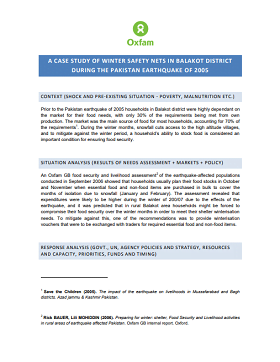
A Case Study of Winter Safety Nets in Balakot District during the Pakistan Earthquake of 2005
Case Study
This case study looks at Oxfam’s response to the Pakistan earthquake and the upcoming winter by providing winterisation vouchers to vulnerable households to be exchanged with traders for required essential food and non-food items. The paper looks at the context, situational analysis, response analysis,...
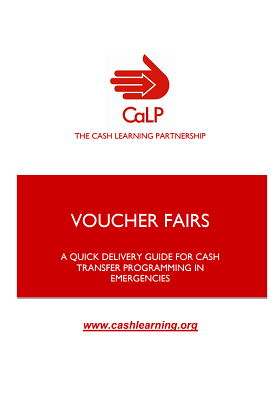
Voucher Fairs: A Quick Delivery Guide (screen version)
Guidelines and Tools
A Quick Delivery Guide to using voucher fairs to implement a market-based emergency response. Prepared as a practical tool, this guide provides a brief synthesis of the necessary preconditions and advantages and disadvantages of using voucher fairs. It also provides practical implementation tips.
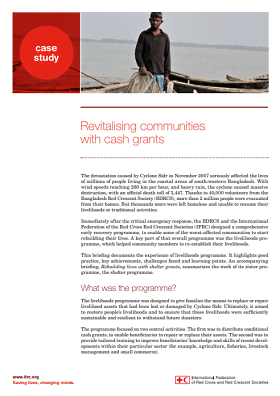
Revitalising communities with cash grants
Case Study
This case study gives an overview of the Red Crescent’s response programme in Bangladesh following the devastation caused by Hurricane Sidr in 2007. Part of the overall programme was the livelihoods programme, which helped community members to re-establish their livelihoods. The programme focussed on...
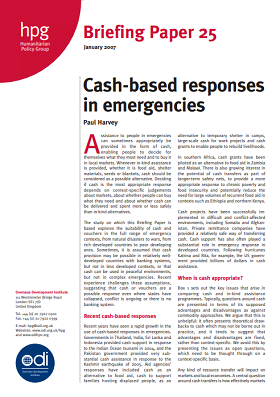
Cash-based Responses in Emergencies
Report
This short HPG briefing paper looks at the suitability of cash based responses in a range of emergency situations. It gives a rapid overview of recent cash based responses and examines the key issues around comparing cash and in-kind programmes. It briefly looks at the impact of cash, the issues of...
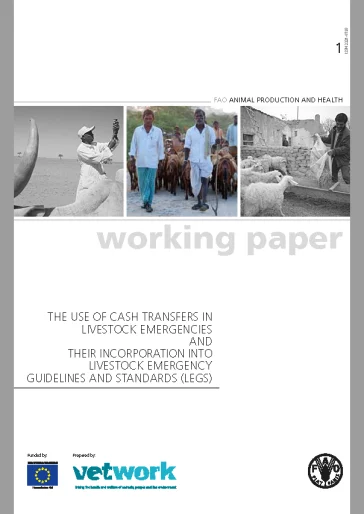
The Use of Cash Transfers in Livestock Emergencies and their Incorporation into Livestock Emergency Guidelines and Standards (LEGS)
Guidelines and Tools
This paper reviews the use of cash transfers within the livestock sector and suggests how they can be incorporated into and support Livestock Emergency Guidelines and Standards (LEGS). The paper’s structure reflects the stages of the LEGS Handbook as these in turn reflect good project cycle management....
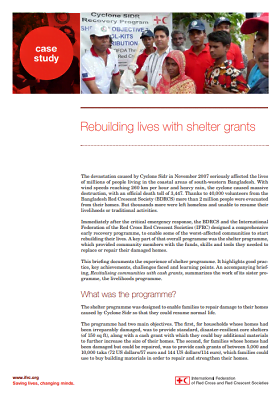
Rebuilding lives with shelter grants
Case Study
Bangladesh following the devastation caused by Hurricane Sidr in 2007. Part of the overall programme was the shelter programme, which provided community members with the funds, skills and tools they needed to replace or repair their damaged homes. Dependent on the damage to the homes, households were...


